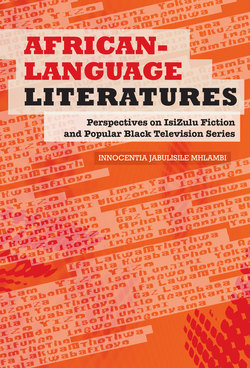African-Language Literatures

Реклама. ООО «ЛитРес», ИНН: 7719571260.
Оглавление
Innocentia Jabulisile Mhlambi. African-Language Literatures
Contents
Dedication
Acknowledgements
Introduction. African-language literatures and popular arts: challenges and new approaches
Limits of the field
Earlier literary approaches
The popular arts paradigm and generative materialism
Overview of the book
1. Proverbs in narratives: Seeing the contemporary through archaic gazes in Aphelile Agambaqa and Impi YaboMdabu Isethunjini
A summary of Aphelile Agambaqa
A summary of Impi YaboMdabu Isethunjini
Proverbs and axioms as plotting strategies
Proverbs as titles of narratives
Proverbs and gender relations
Proverbs and traditional practices
Proverbs and the boundaries of the family
Proverbs and the moral lessons of post-apartheid society
Conclusion
2. Nested narratives: ‘Some are seated well […] while others are not seated at all’
A summary of Yekanini Ukuzenza
A summary of Isifungo
Adaptation, hegemony and folktales
Gender identities and folktale patterns in Isifungo
Some discourses ‘are seated well’ […] they are traditional authority!
Straight out of traditionalism: Yekanini Ukuzenza’s didacticism
Conclusion
3. Acts of naming: The detective plot in Masondo’s fiction
An overview of Masondo’s acts of naming in his fiction
Literary Onomastics: Analysis of character through names
Ethnographic study of names
Disrupting and de-stereotyping archetypal representations
The paradox at the heart of Masondo’s acts of naming and characterisation
Culture: Praises and naming in Masondo’s novels
Conclusion
4 ‘A world in creolisation’: Inheritance politics and the ambiguities of a ‘very modern tradition’ in two black South African TV dramas
Moving into film with Barber’s model
Artistic entanglements: The relationship between the African-language literary tradition and South African black film
Creolised cultures in former colonial countries
Summary of Ifa LaKwaMthethwa
Summary of Hlala Kwabafileyo
Residues of cultural elements in Ifa LakwaMthethwa
Finding the limits of a creolised middle ground
Black TV colonised: Adapting film conventions to accommodate orality
Female sexuality and inheritance politics in Hlala Kwabafileyo
Conclusion
5. Thematic re-engagements in the television drama series Gaz’ Lam and isiZulu literature
Narrating a mosaic
Summary of Gaz’ Lam
Arranged marriages
Re-evaluation of youth migration
Jim comes to Jo’burg: celebrating a dream in the city through music
Articulating re-marginalisation through tsotsitaal
Conclusion
6 ‘It is not crime in the way you see it’: Kuyoqhuma Nhlamvana’s rewriting of Yizo Yizo’s crime discourse and outlaw culture
Summary of Yizo Yizo
Summary of Kuyoqhuma Nhlamvana
Racialised crime control strategies in Yizo Yizo
The law and the outlaw culture in Yizo Yizo
Girls’ subcultures: The girl child dilemma in Yizo Yizo
(Un)lawfulness and youth militarism
Representations of organised crime in Kuyoqhuma Nhlamvana
The transboundary factors and criminal families
Criminal exploitation of delinquent youth
Criminal networks
Conclusion
7. Conclusion
Index
Отрывок из книги
African-language Literatures
New Perspectives on IsiZulu Fiction and Popular Black Television Series
.....
Chapter three is concerned with isiZulu narratives which have been influenced by oral forms like praises and naming. According to Masondo (1997) naming has been the most valued practice in the culture of the Zulu people. He points out that there are different reasons why people choose particular names. With regard to names for people, some names are coined even before they are born or when they are born or long after they have been born, in their adulthood. Certain messages are sent by the people who coin the name. Given that praises and naming play such a crucial role in the traditions of the Zulu people, in this book, drawing on Barber’s model, I will discuss narratives where the creative use of names and praises in the text reflects not only a stylistic form but a moral lesson which the reader knows to be encapsulated in the meaning of the names. In chapter three I will explore the uses of naming in Ingwe Nengonyama (1994) (The Leopard and the Lion) and Ingalo Yomthetho (1994) (The arm of the law), which are detective narratives by Masondo.
The last three chapters of the book discuss black television series, in particular the focus is on new themes that emerged in television drama series after 1994. From the early 1990s, the South African Broadcasting Corporation, in their programming, emphasised social engineering policies, such as nation-building and neo-liberalist policies, that were to be aligned with South Africa’s new political economy. In the fourth chapter, through a study of two South African drama series, Ifa LakwaMthethwa and Hlala Kwabafileyo, I will discuss how these African-language television series drew from changing, post-1994 economic policies and popular culture discourses to construct narratives that were ‘aspirational’ (as defined by Vundla and McCathy, producers of Generations and Gaz’ Lam II (respectively). As part of broader concerns of this chapter I will highlight notions of contemporaneity brought about by the interplay between tradition and modernity, the international world and the local, and the flow of metropolitan meaning through national culture to that of the most remote backwater villages. The change, emphasised by the thematic frontiers of these series, is read against the cultural frames of inheritance conventions which, in both filmic narratives, are signalled by the pivotal use of the genres from oral or popular discourse.
.....